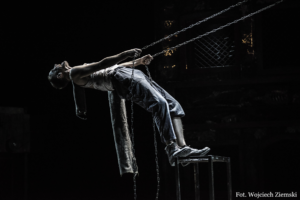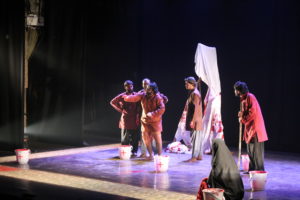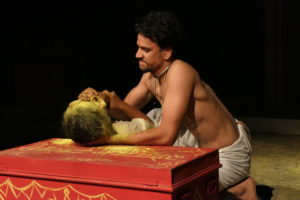Sorry Mamma and Top Secret by Abdul Latif Khatana
The Plays
Sorry Mamma
In this play, the mother thinks that she is aware of her daughter and son’s activities, whereas, on the other hand the children are thinking vice-versa.The things they see, listen and observe, affect them, and according to the provided stimulus, they react and act genuinely.
Top Secret
In the play,the landlord threatens Vicky’s father toeither clear the rent that is due for last five monthsor vacate the house. Vicky’s father has hardly earned anything in those five months. Vicky gets deprived of going for a picnic from school. His school friends arrange money for Vicky. But the landlord asks Vicky’s father to leave the house.
Director’s NoteIn context of children as well as the dramatic world, we started with the five psycho-social developmental stages of childhood as explained by Erik H. Erikson. All the developing phases of childhood have a through line of super-speed action for a child to trace his/her journey on the scale of life with parents, family, neighbourhood, school, peers, friends and role models, before entering into adulthood. During this rushed journey into the unknown, the child develops the desired qualities of hope, will, purpose, competence and the virtue of staying true to others. All these ideas were explored on floor with practical exercises, tasks and improvisation in sub-groups, encouraging students to understand childhood on one hand and develop a creative working experience with all the members of the group on the other.
The Director & Playwright
Abdul Latif Khatana graduated from NSD in 1986 with specialisation in Acting. In addition to devising, writing and directing several plays that have been nationally and internationally performed, he has conducted numerous workshops on acting. He is the founder of Adabi Sangat(Kashmir) and the theatre group- Kirdar. He is a founder member and the Chief of NSD’s Theatre-in-Education Company. He is credited with conceptualising and organising the company’s first national theatre festival for children called ‘Jashn-e-Bachpan’, followed by another national festival, ‘Bal Sangam’, of folk and traditional performing arts by children. He has contributed in designing the theatre/drama syllabus of NCERT for classes 1 to 12. He has taught in various theatre institutions, colleges,
universities, and NGOs throughout the country and abroad. Currently, he is an Associate Professor of acting at NSD, Delhi besides looking after its TIE Company. The GroupThe National School of Drama is a premier theatre institution imparting training in dramatic arts. It is an autonomous organization, fully financed by the Govt. of India. Over the year the school has progressed on various aspects of theatre including a rapid expansion of its activities in all part of the country. Under its outreach program the National School of Drama (T.I.E. Wing) Tripura started one-year certificate course in Theatre-in-Education on 9th August, 2012.
Cast & Credits
Sorry Mamma
Sushant : Samiran Brahma
Dinesh : Didwm Basumatary
Anand : Ankit Lohar
Riki : Rajat Singha
Rupa : Thokchom Roshni Devi
Mom : Haobam Hemlata Devi / Sharmistha Chakraborty
Teacher : Sharmistha Chakraborty
Top Secret
Vicky : Birendra Ganju
Mother : Dipika Dutta Mukherjee
Teacher : Dipika Dutta Mukherjee / Rupasree Debnath
Scrap Collection & Rocky : Kilang TemsuImsong / Raju Debnath
Father : Sonit Jyoti Saikia
Landlord & Champak : Binoytosh Ghosh / Rakesh Bora
Binto : G. Imotomba Sharma
Pinky : Ila Das
Assistant Director : Manik Roy
Designer : Babita Pandey
Music Director : Suneet Bora
Assistant Music : Surajit Debbarma
Choreography : Vikram Mohan
Light Design : G. Imotomba Sharma / ManojitDebroy
Light Operation : Manik Roy & G. Imotoba Sharma
Stage Manager : JayantaDey
Back Stage : Bansing Basumatary / UttamChakraborty / Pabitra Mashahary& Kajal Das
Programme Coordinator : Subir Roy
Assistant : Jagmohan Singh Negi
Camp Director : Vijai Kumar Singh
Playwright & Director : Abdul Latif Khatana


